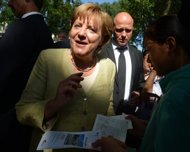Rocky road ahead for Merkel as crisis, polls loom

Merkel, who has just resumed work with a visit to Canada after a break in the mountains of Italy and her cottage north of Berlin, will meet the leaders of France, Greece, Italy and Spain for emergency talks over the next three weeks.
The diplomatic blitz on the perilous future of the 17-nation euro area will culminate for Merkel in a ruling by Germany's top court on September 12 on legal challenges to the crisis-fighting tools she has championed.
"The debt crisis is going to dominate her calendar," political scientist Oskar Niedermayer at Berlin's Free University said, looking ahead to a rocky campaign year that will decide whether Merkel wins a third term.
Merkel's conservatives are still leading in the polls ahead of the general election, which must be held between late August and early October 2013.
But the threat of voter backlash, political turbulence and economic fallout embedded in the eurozone turmoil are likely to shape the response to the crisis in Germany, Europe's top economy and the paymaster for its rescue funds.
The flurry of visits begins Thursday with French President Francois Hollande in Berlin, followed by Greek Prime Minister Antonis Samaras Friday amid reports he is seeking wiggle room for implementing budget cuts demanded by creditors.
The clock is ticking for Athens, with the troika of international creditors due to release a progress report on its reforms in mid-September, which Merkel has said will be the basis for deciding whether to unlock further aid.
Meanwhile a meeting with Italian Prime Minister Mario Monti is also due by the end of August, followed by talks with Spain's Mariano Rajoy in Madrid on September 6.
Both pressured Merkel to make key concessions at a European Union summit in late June, as they struggle with crippling borrowing costs.
Merkel has at times seemed rattled by the rage her austerity-driven approach has generated in southern Europe, where one Italian newspaper compared her government to a "Fourth Reich".
Her hopes that structural reforms will restore long-term confidence in the eurozone sit well with a German public that feels it is now reaping the benefits of tough budget cuts and a labour market overhaul a decade ago.
Merkel said before her summer holidays that the euro would dominate the election campaign.
But her crisis management is complicated to an even greater degree by restive members of her own centre-right coalition, particularly the small pro-business Free Democrats, who are struggling for their political survival.
Polls show they will have to fight to clear the five-percent hurdle for representation in parliament next year, and that even if they do, it is unlikely the current governing alliance will muster a ruling majority.
This precarious position has led some of its ministers to stray far off-message.
Economy Minister Philipp Roesler, who is also Merkel's vice chancellor and FDP leader, has voiced doubts about Greece's shot of holding onto the euro.
And Markus Soeder, a leading member of the Christian Social Union, the Bavarian sister party to Merkel's Christian Democrats, said further to aid to Greece would be like "pouring water on the desert".
But the main opposition party, the Social Democrats (SPD), appears unlikely to mount much of a challenge next year and may well end up as junior partners in a "grand coalition" like the one Merkel led during her first term in 2005-2009.
Niedermayer noted that the SPD, which is trailing Merkel's party by about seven points, had trouble charting a distinct course in the crisis.
"The SPD, with the exception of a few members, has backed the rescue measures by Merkel's government 10 times in two years in parliament," he said.
A poll last week indicated that Merkel would win handily against any of three SPD candidates the party is likely to field against her.
"Even after the EU summit last June when she had to make concessions to countries of southern Europe, a large majority of Germans continued to back her approach," a Merkel biographer, political scientist Gerd Langguth, said.
But that view could change quickly in the face of a looming economic slowdown in Europe's powerhouse.
"With global growth slowing, we don't expect the resilience of the core's exports to last much longer, while domestic demand looks set to remain subdued," Capital Economics research consultancy wrote from London Friday.
"We still see both Germany and France slipping into recession in 2013."
What the stars mean:
★ Poor ★ ★ Promising ★★★ Good ★★★★ Very good ★★★★★ Exceptional
 Tag:
Tag:
Related Contents
Latest News
More News
- Russian President congratulates Vietnamese Party leader during phone talks (January 25, 2026 | 09:58)
- Worldwide congratulations underscore confidence in Vietnam’s 14th Party Congress (January 23, 2026 | 09:02)
- Political parties, organisations, int’l friends send congratulations to 14th National Party Congress (January 22, 2026 | 09:33)
- 14th National Party Congress: Japanese media highlight Vietnam’s growth targets (January 21, 2026 | 09:46)
- 14th National Party Congress: Driving force for Vietnam to continue renewal, innovation, breakthroughs (January 21, 2026 | 09:42)
- Vietnam remains spiritual support for progressive forces: Colombian party leader (January 21, 2026 | 08:00)
- Int'l media provides large coverage of 14th National Party Congress's first working day (January 20, 2026 | 09:09)
- Vietnamese firms win top honours at ASEAN Digital Awards (January 16, 2026 | 16:45)
- ASEAN Digital Ministers' Meeting opens in Hanoi (January 15, 2026 | 15:33)
- ASEAN economies move up the global chip value chain (December 09, 2025 | 13:32)



















 Mobile Version
Mobile Version